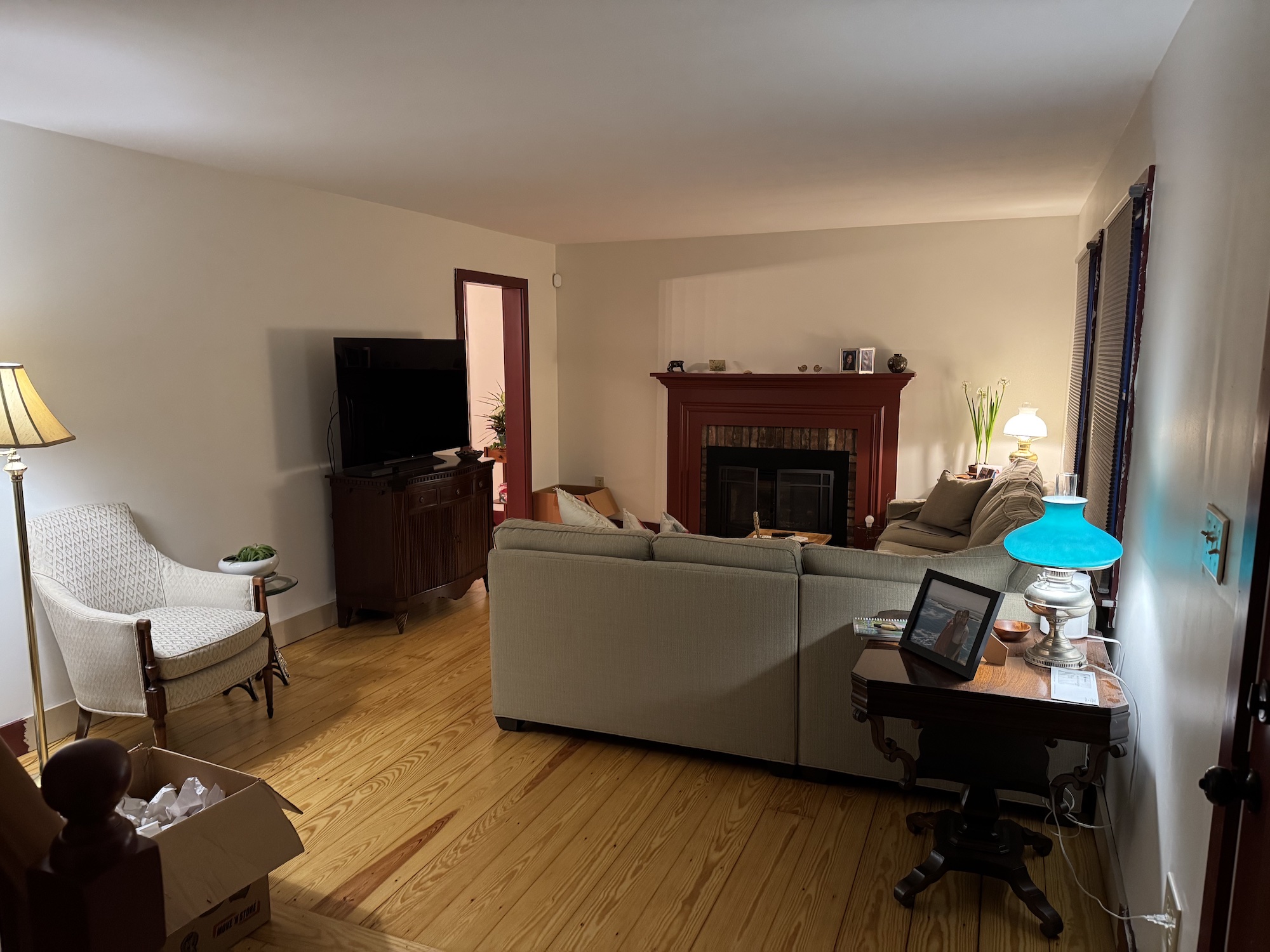Last weekend, we went into Albany, with my brother and sister-in-law, to have dinner with friends of theirs, and to attend an exhibit at the lovely Albany Institute of History and Art. The exhibit is called “Americans Who Tell The Truth,” and it features portraits by Robert Shetterly, along with quotes from his truth-telling subjects.
Shetterly’s art is unusual. His portraits are simple, even primitive in some respects. The bodies of his subjects, and the backgrounds of his paintings, are flat, lacking in detail, unremarkable. But the faces are nuanced, instantly recognizable, filled with life and spirit and personality. And the names of the subjects, as well as their quotations, are scratched into the paintings themselves (while the paint is still wet, as my brother, the painter, pointed out). Shetterly has painted more than two-hundred truth-tellers, including forty-two that have been selected for the Institute’s exhibit. Some of those included are obvious selections. Others are less well-known, and still others have somewhat checkered histories, which makes for an interesting blend of portraits.
On the one hand, featured subjects include Rosa Parks and Bayard Rustin, Pete Seeger and Ella Baker, Cecile Richards, the late president of Planned Parenthood, and Sister Helen Prejean, the anti-death-penalty crusader portrayed in the movie Dead Man Walking. But among the other truth-tellers whose portraits are on display, are John Brown, the anti-slavery activist whose violent raid on Harper’s Ferry in 1859 resulted in several deaths and helped to spark the Civil War; Mother Jones, the late-Nineteenth/early-Twentieth century labor organizer and activist; Frank Serpico, the New York city cop who resisted and later exposed corruption within the police department, at risk of his own life, and whose harrowing story was brought to life in Serpico, a 1973 movie starring Al Pacino and directed by Sidney Lumet.
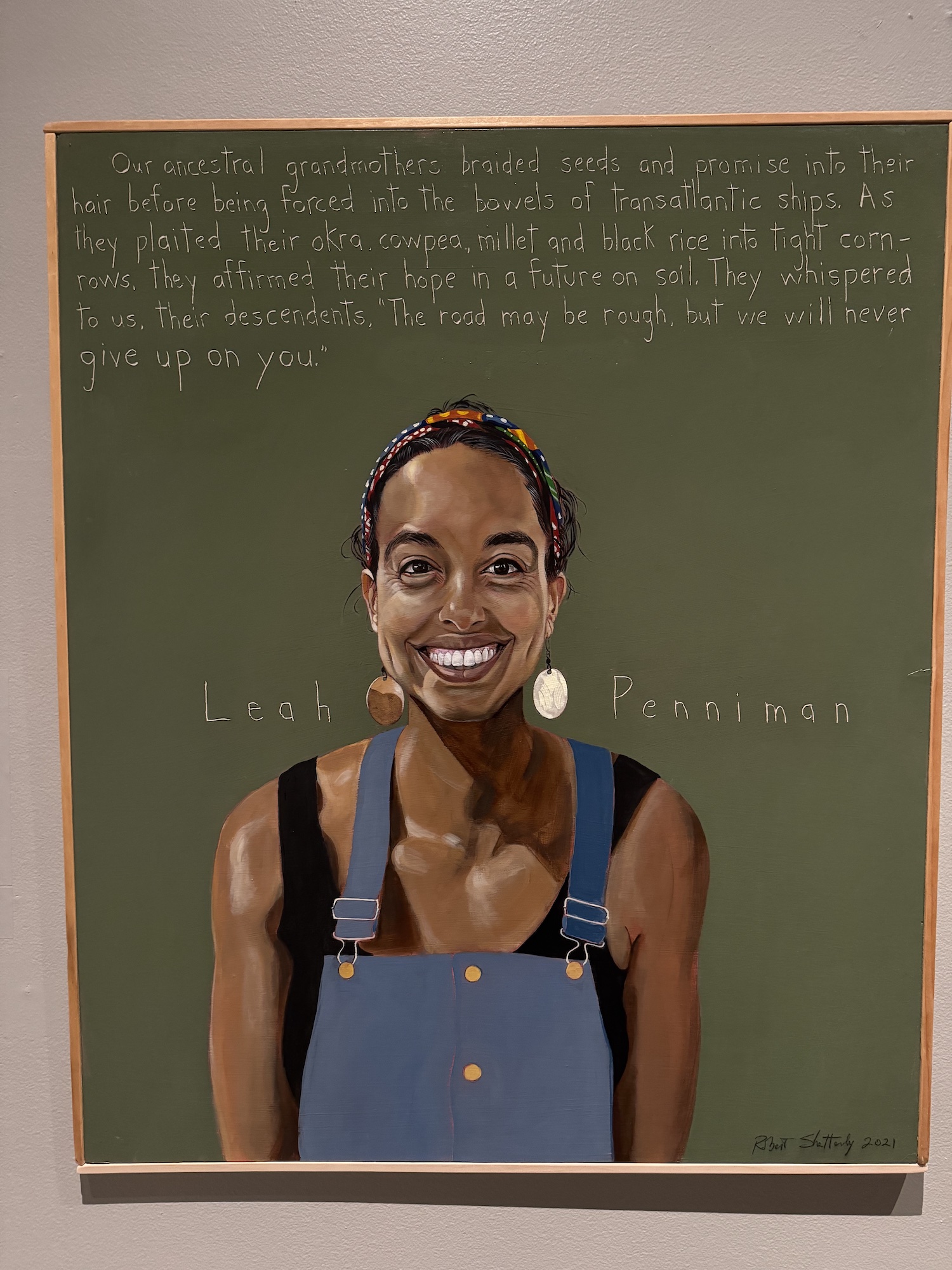 Yet, the figures who fascinated me most during our afternoon at the museum were those of whom I’d known nothing — not even their names — before seeing the exhibit. One of them was Leah Penniman, a food justice advocate and activist whose portrait exudes warmth and joy. Her quote is wonderful and worth repeating in full:
Yet, the figures who fascinated me most during our afternoon at the museum were those of whom I’d known nothing — not even their names — before seeing the exhibit. One of them was Leah Penniman, a food justice advocate and activist whose portrait exudes warmth and joy. Her quote is wonderful and worth repeating in full:
Our ancestral grandmothers braided seeds and promise into their hair before being forced into the bowels of transatlantic ships. As they plaited their okra, cowpea, millet and black rice into tight cornrows, they affirmed their hope in a future on soil. They whispered to us, their descendants:
“The road may be rough, but we will never give up on you.”
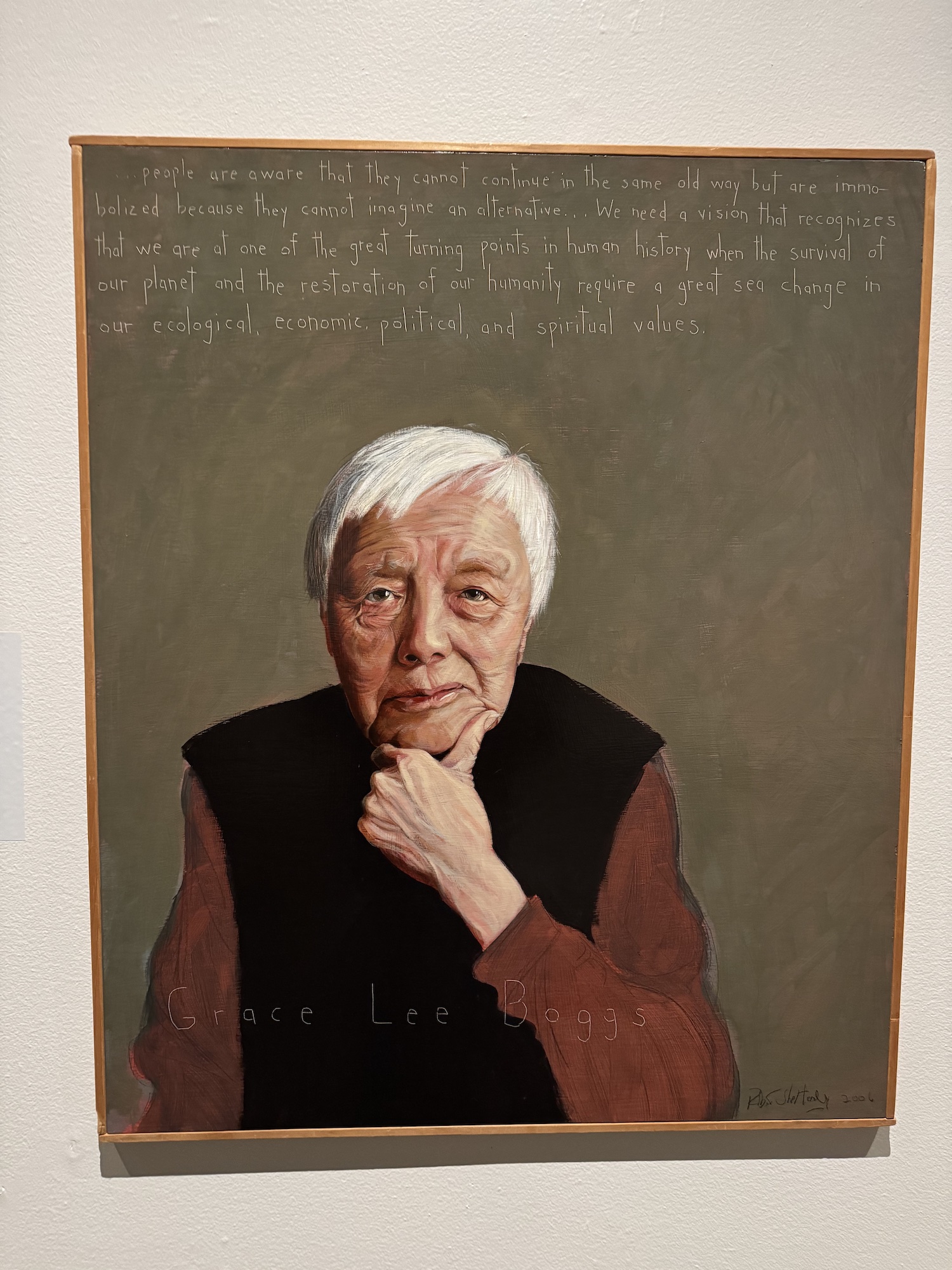 Another was Grace Lee Boggs, an author and community organizer, who gazes out from her portrait appearing tough, frank, unwilling to put up with any BS. Her quote:
Another was Grace Lee Boggs, an author and community organizer, who gazes out from her portrait appearing tough, frank, unwilling to put up with any BS. Her quote:
People are aware that they cannot continue in the same old way but are immobilized because they cannot imagine an alternative… We need a vision that recognizes that we are at one of the great turning points in human history when the survival of our planet and the restoration of our humanity requires a great sea change in our ecological, economic, political, and spiritual values.
Few moments in our nation’s history have demanded more of American truth-tellers than the one we find ourselves in right now. We are governed by liars, bombarded by falsehoods every time we go online or turn on certain news channels, confronted by people — some of them friends, some of them family, most of them well-meaning — who have armed themselves with misinformation in order to parrot talking points they have heard on TV or from someone else who might be equally well-meaning and equally misinformed. Just the other day, I encountered online a post from someone I like and respect, who was repeating the jumble of untruths and recklessly manipulated data used by this Administration to justify their disastrous tariffs. I didn’t bother to comment. I didn’t wish to alienate a friend, nor did I have the energy or inclination to engage in a flame war. Instead, I allowed the disinformation to go unchallenged. I’m not proud of this.
Fallacy, disingenuousness, quackery, distortion. They pummel us. They insinuate themselves into every discourse. They are disheartening, infuriating, exhausting.
Which makes Robert Shetterly’s bold honoring of those who have stood up for truth again and again, all the more admirable, all the more important. We as a people have been challenged before by those who traffic in lies, and ultimately honesty has prevailed. Truth broke Joseph McCarthy’s fear-driven hold on the U.S. Congress, just as it ended the corrupt presidency of Richard Nixon. I choose to believe that it will wash away the bullshit that currently coats our most sacred institutions. But I have to be willing to stand up for honestly when next I am presented the opportunity. All of us do. We need to be inspired by those who inspired this exhibition.
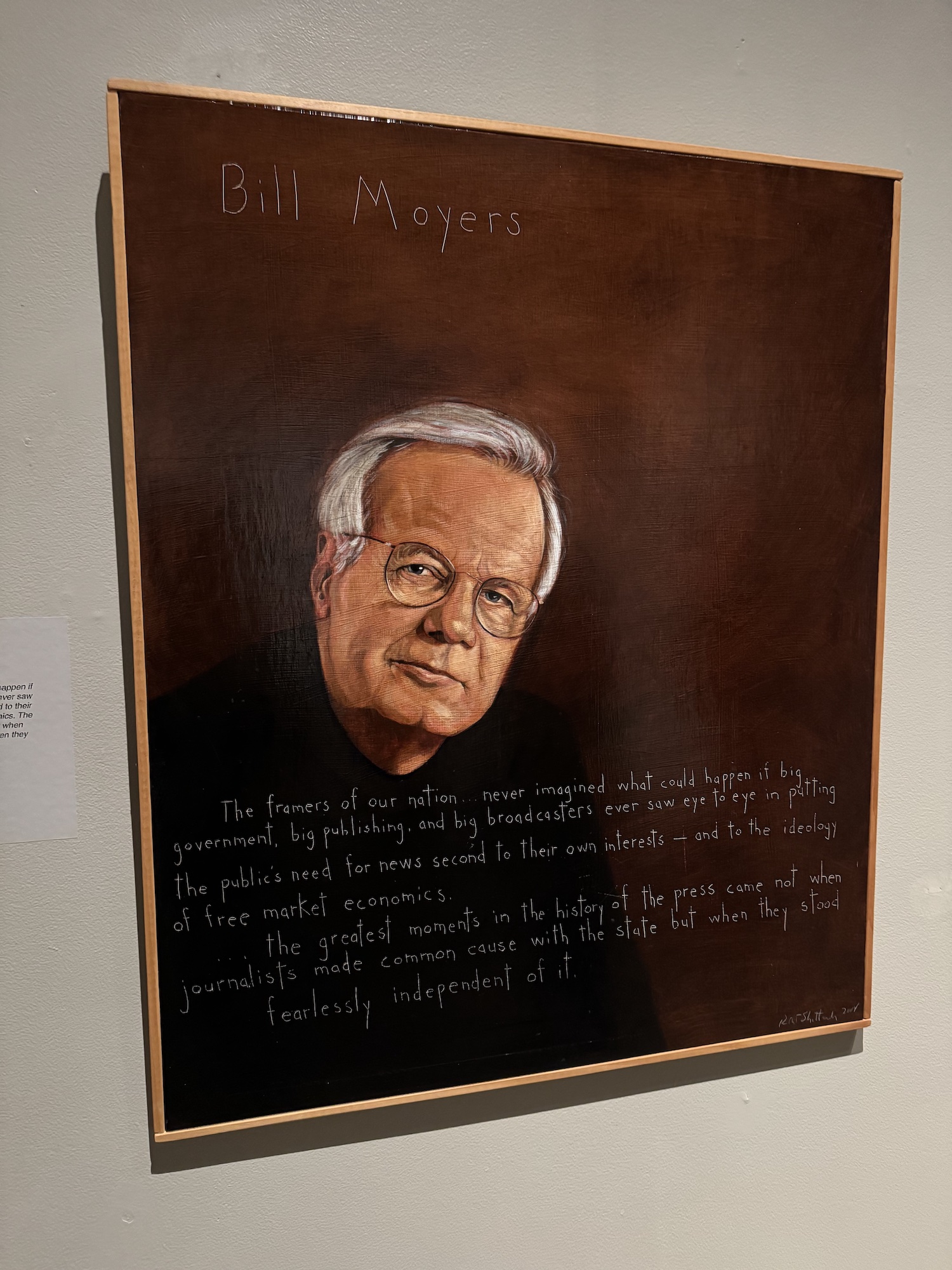 One of my favorite portraits was of a media hero of mine, PBS’s Bill Moyers. I will leave it to him to have the last word:
One of my favorite portraits was of a media hero of mine, PBS’s Bill Moyers. I will leave it to him to have the last word:
The framers of our nation never imagined what could happen if big government, big publishing, and big broadcasters ever saw eye to eye in putting the public’s need for news second to their own interests – and to the ideology of market economics.
The greatest moments in the history of the press came not when journalists made common cause with the state but when they stood fearlessly independent of it.









 Clara Bartels was born in Amsterdam and came to the United States as a small child. Her father was a diamond cutter, and diamond cutters were in great demand in the diamond district of New York City. She grew up around the block from Jacques Cohen, who later in life changed the family’s last name to Coe, and whose father also was a diamond cutter who emigrated from Amsterdam. They would marry, have three kids, and then divorce, bitterly, at a time when divorce was not really something people were supposed to do.
Clara Bartels was born in Amsterdam and came to the United States as a small child. Her father was a diamond cutter, and diamond cutters were in great demand in the diamond district of New York City. She grew up around the block from Jacques Cohen, who later in life changed the family’s last name to Coe, and whose father also was a diamond cutter who emigrated from Amsterdam. They would marry, have three kids, and then divorce, bitterly, at a time when divorce was not really something people were supposed to do.

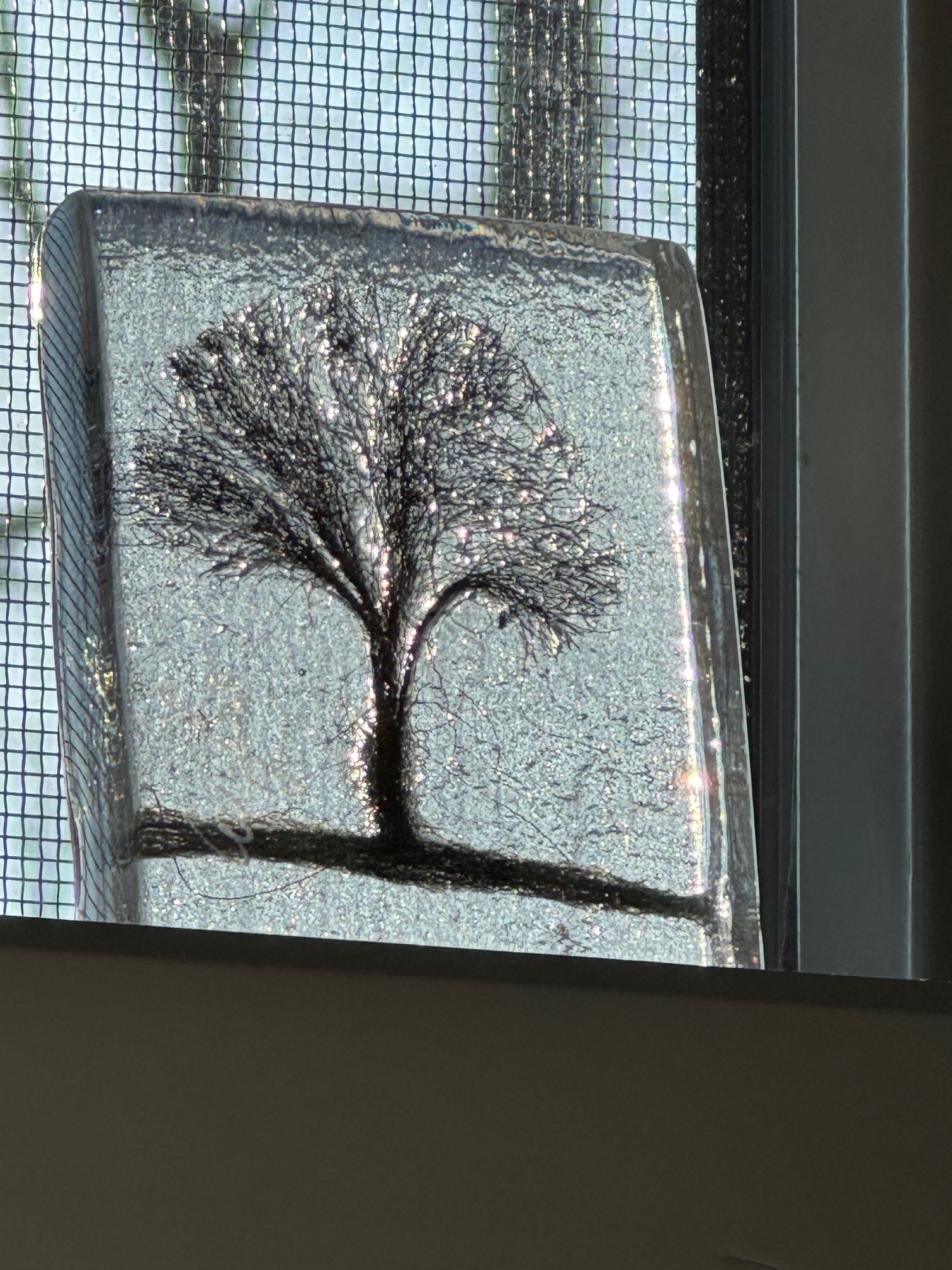 I kept it wrapped up even after we returned to the States. My plan was to open it once we were in our new house, which is what I did. It now sits in my office window, catching the late afternoon sun. And it reminds me of so much. That trip to Italy, which marked the beginning of my personal recovery from the trauma of losing Alex. That day in Venice, which was gloriously fun. The conversation with the kind shopkeeper, whose love for and pride in his father was palpable throughout our exchange. More, that little glass piece is an image of winter, and it sparkles like a gem when the sun hits it. It reminds me that even after a long cold winter, a time of grief and pain, there is always new life and the joy of a new spring.
I kept it wrapped up even after we returned to the States. My plan was to open it once we were in our new house, which is what I did. It now sits in my office window, catching the late afternoon sun. And it reminds me of so much. That trip to Italy, which marked the beginning of my personal recovery from the trauma of losing Alex. That day in Venice, which was gloriously fun. The conversation with the kind shopkeeper, whose love for and pride in his father was palpable throughout our exchange. More, that little glass piece is an image of winter, and it sparkles like a gem when the sun hits it. It reminds me that even after a long cold winter, a time of grief and pain, there is always new life and the joy of a new spring.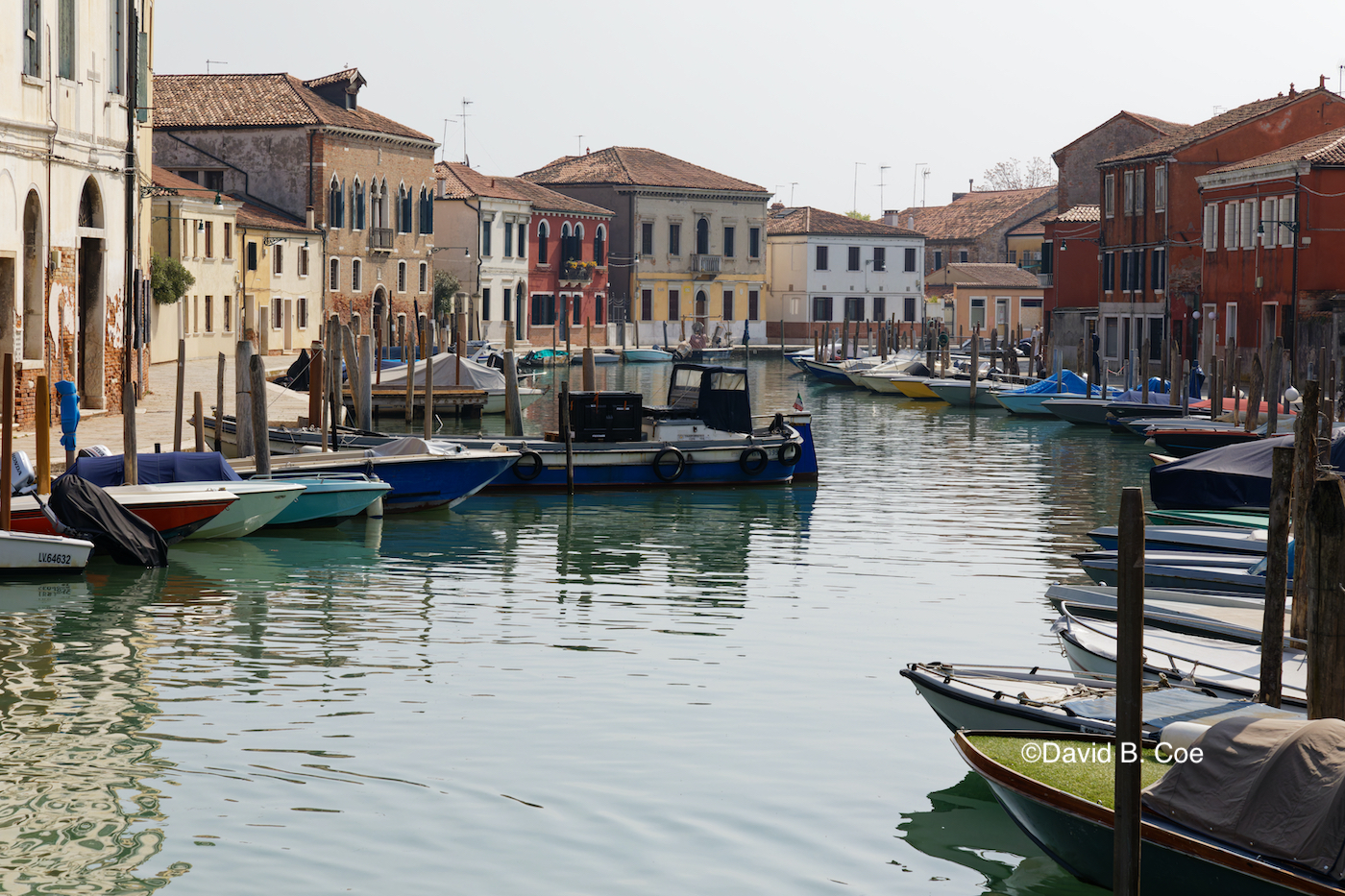 A cliché, to be sure. But as with so many clichés, it’s rooted in truth.
A cliché, to be sure. But as with so many clichés, it’s rooted in truth.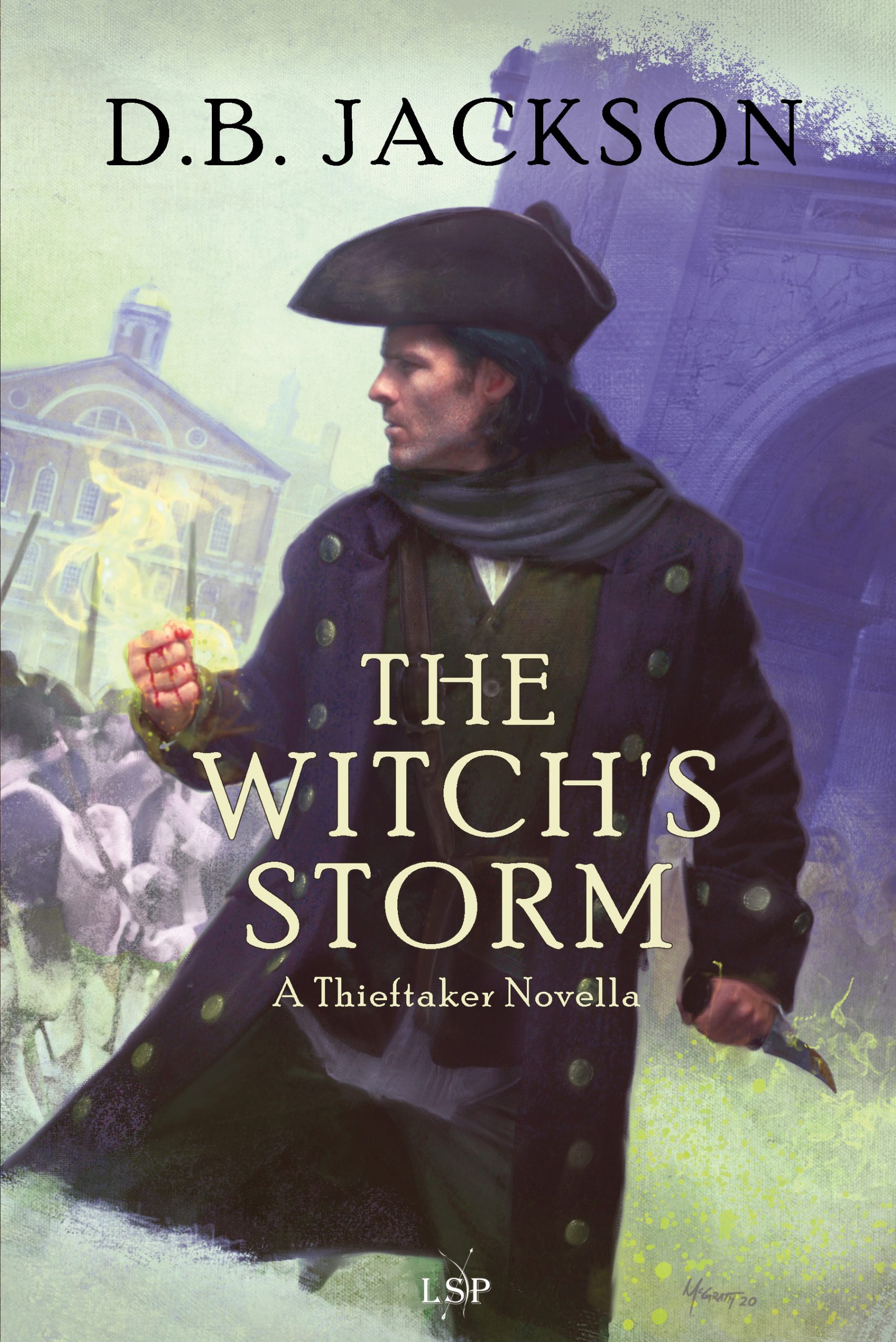 What qualities make a villain compelling? I intend to dive into that. Who are some of my favorite villains? I’ll get into that, too. But let me offer a few quick points up front. I don’t think much of the all-powerful-evil-through-and-through villains one often encounters in the fantasy genre. Sauron, for instance — the evil god whose world-conquering designs lie at the heart of J.R.R. Tolkien’s The Lord of the Rings — is, to my mind, a very boring villain. He’s really powerful, and he’s really, really evil. And yes, he’s cunning, which is a point in his favor, and he’s scary (or his minions are). But beyond that, and unless one has gone back and read all his backstory in The Silmarillion, there isn’t really much to him. He lacks dimension and complexity.
What qualities make a villain compelling? I intend to dive into that. Who are some of my favorite villains? I’ll get into that, too. But let me offer a few quick points up front. I don’t think much of the all-powerful-evil-through-and-through villains one often encounters in the fantasy genre. Sauron, for instance — the evil god whose world-conquering designs lie at the heart of J.R.R. Tolkien’s The Lord of the Rings — is, to my mind, a very boring villain. He’s really powerful, and he’s really, really evil. And yes, he’s cunning, which is a point in his favor, and he’s scary (or his minions are). But beyond that, and unless one has gone back and read all his backstory in The Silmarillion, there isn’t really much to him. He lacks dimension and complexity. Some of my favorite villains from my own work? Quinnel Orzili from the Islevale Cycle (Time’s Children, Time’s Demon, Time’s Assassin), Saorla from the second and third books in The Case Files of Justis Fearsson, and, my absolute favorite, Sephira Pryce from the Thieftaker books. Yes, she later become something other than a pure villain, but that was basically because she became SO much fun to write that I had to find a way to keep her around and relevant.
Some of my favorite villains from my own work? Quinnel Orzili from the Islevale Cycle (Time’s Children, Time’s Demon, Time’s Assassin), Saorla from the second and third books in The Case Files of Justis Fearsson, and, my absolute favorite, Sephira Pryce from the Thieftaker books. Yes, she later become something other than a pure villain, but that was basically because she became SO much fun to write that I had to find a way to keep her around and relevant.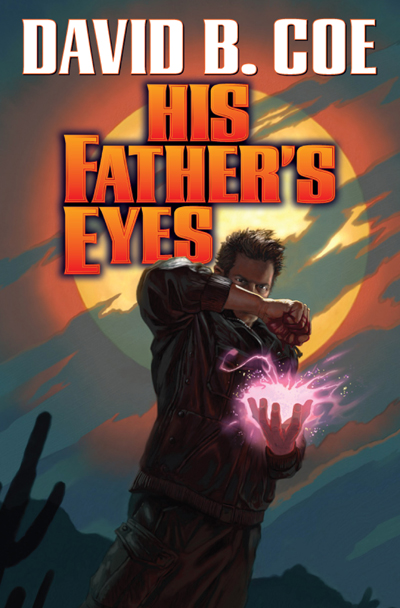 My favorite villains in the work of others? I already mentioned Brandan of Ygrath. John Rainbird, from Stephen King’s masterpiece, Firestarter, is a terrific villain. Smart, brutal, and yet also human. In Catie Murphy’s marvelous Negotiator trilogy there are two supernatural “bad guys,” Daisani and Janx, whose personal rivalry threatens the fabric of the mortal world. Their mutual animus and their own needs and desires humanize them and make them terrific foils for Magrit Knight, the series’ protagonist. And I would add that a certain writer I care not to mention in light of recent revelations has created some truly amazing villains. Too bad he wound up being a villain worthy of his own undeniable storytelling talents.
My favorite villains in the work of others? I already mentioned Brandan of Ygrath. John Rainbird, from Stephen King’s masterpiece, Firestarter, is a terrific villain. Smart, brutal, and yet also human. In Catie Murphy’s marvelous Negotiator trilogy there are two supernatural “bad guys,” Daisani and Janx, whose personal rivalry threatens the fabric of the mortal world. Their mutual animus and their own needs and desires humanize them and make them terrific foils for Magrit Knight, the series’ protagonist. And I would add that a certain writer I care not to mention in light of recent revelations has created some truly amazing villains. Too bad he wound up being a villain worthy of his own undeniable storytelling talents. What else have I got? Several years back, while attending a World Fantasy Convention, I bought signed prints of
What else have I got? Several years back, while attending a World Fantasy Convention, I bought signed prints of  We have a few nice pieces of art that once belonged to my parents. We have photos we purchased just outside of Zion National Park — photos of the park taken by photographer
We have a few nice pieces of art that once belonged to my parents. We have photos we purchased just outside of Zion National Park — photos of the park taken by photographer 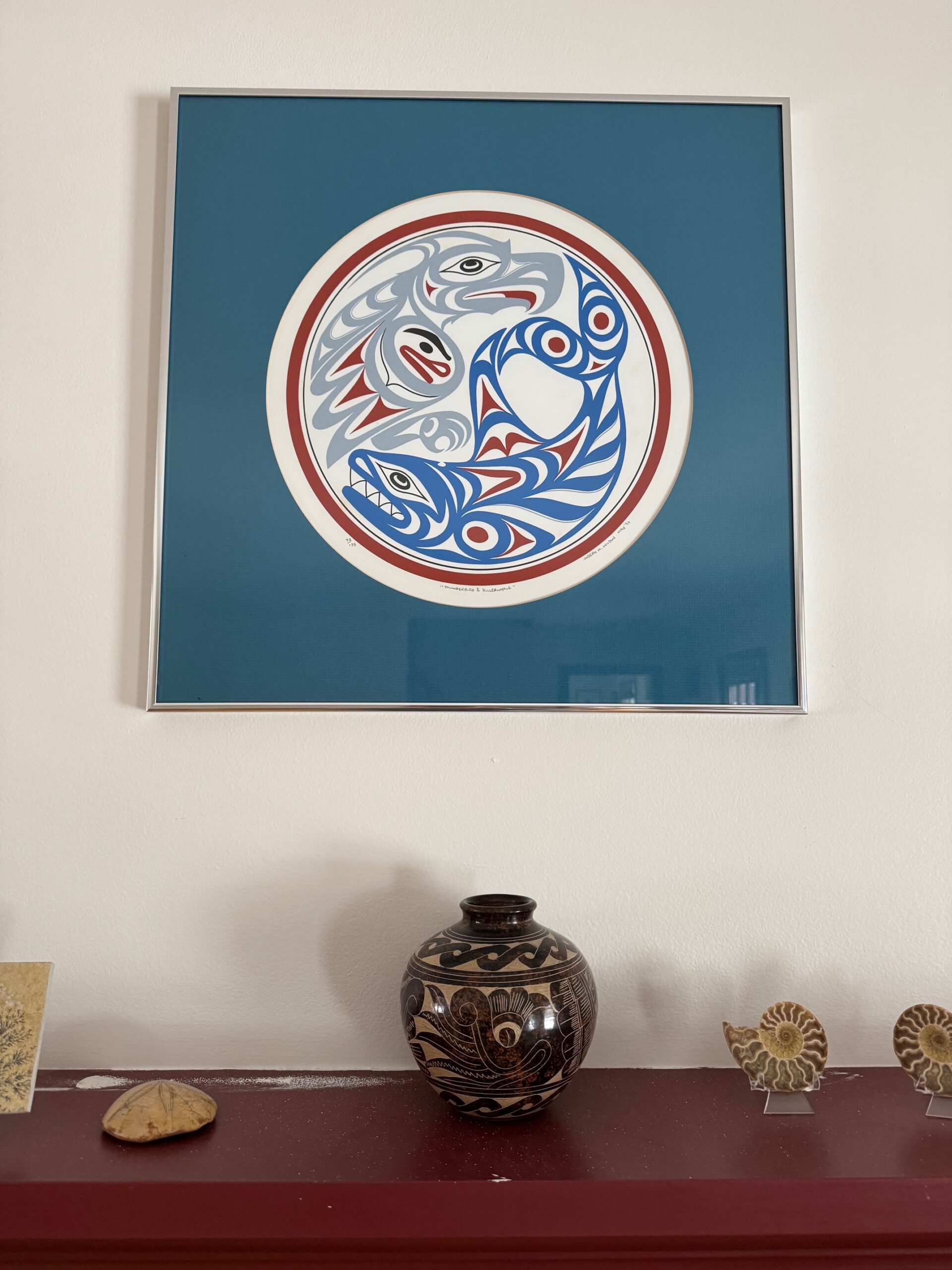 Of course, we have tons of smaller photos all around the house, of our darling daughters, of our parents and siblings, of friends, of our wedding.
Of course, we have tons of smaller photos all around the house, of our darling daughters, of our parents and siblings, of friends, of our wedding.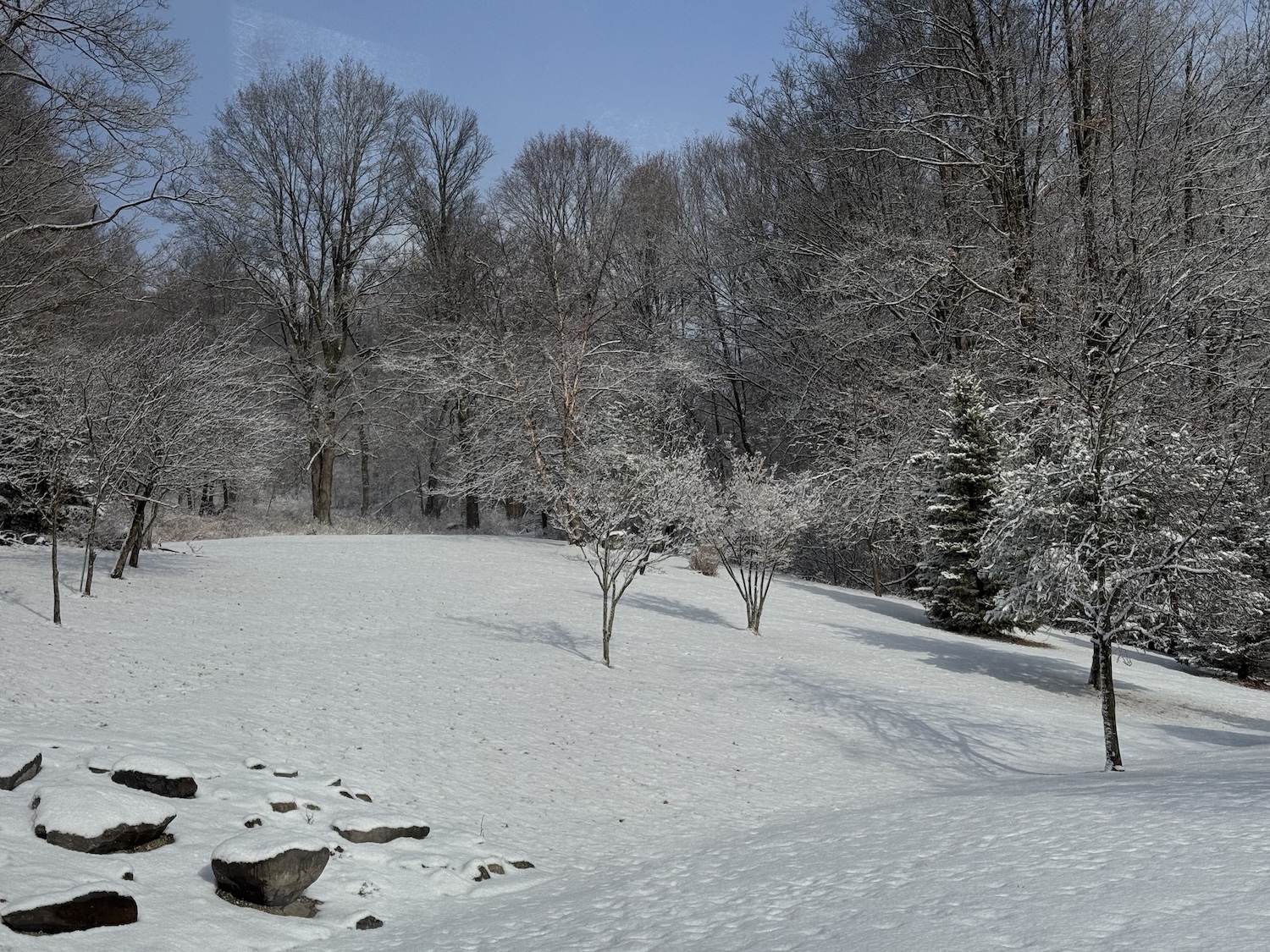
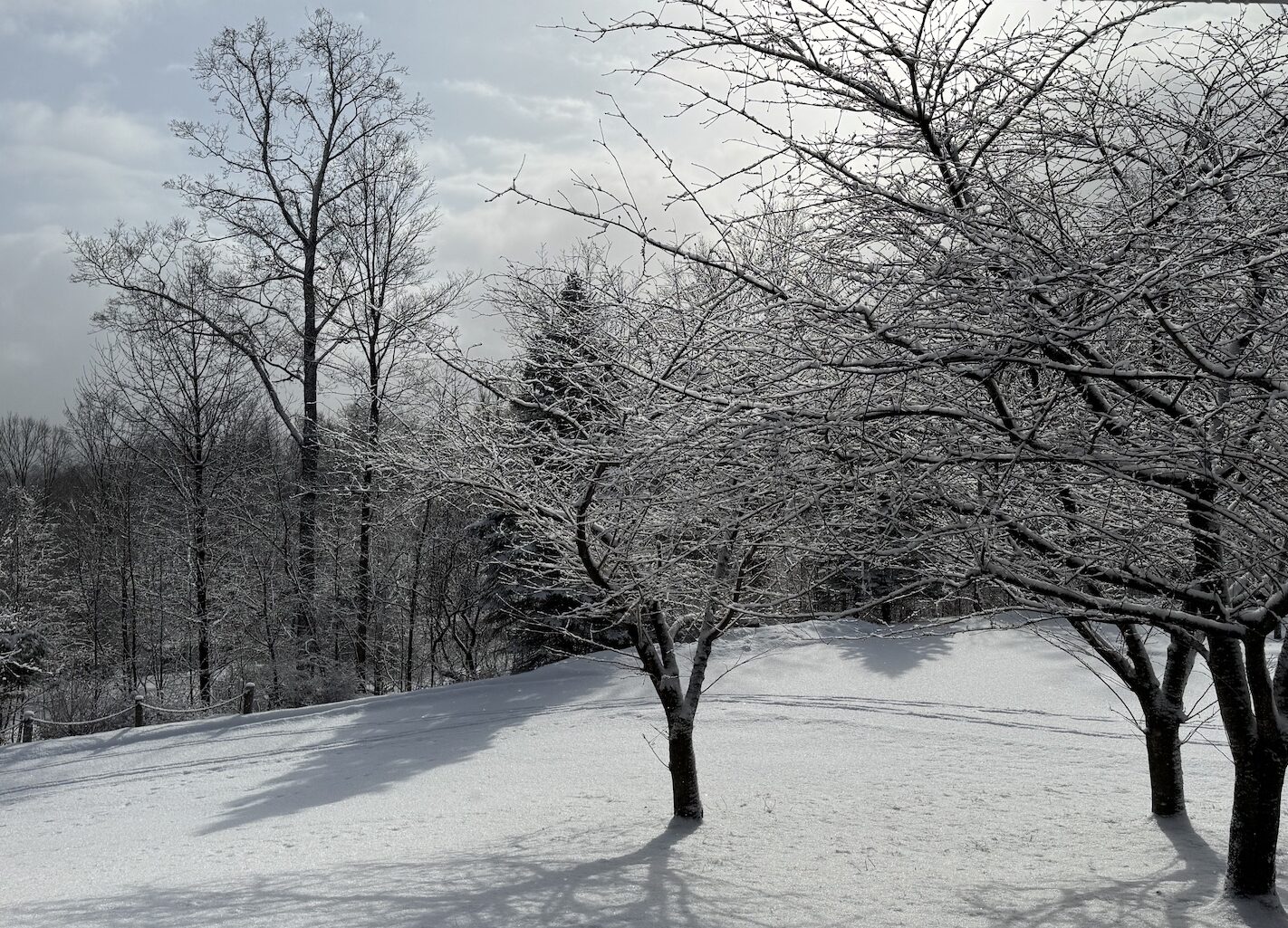 We woke this morning to a snow squall, something that happened with ever-decreasing frequency during our years in Tennessee, as climate change made the warm South even warmer. Here in New York, during the winter months, snow is still the default when there’s precipitation, and I love that. I have missed snow and don’t mind paying the plow guy or dealing with snow on the walkways and driveway. The beauty of an early morning snowfall more than makes up for the inconveniences.
We woke this morning to a snow squall, something that happened with ever-decreasing frequency during our years in Tennessee, as climate change made the warm South even warmer. Here in New York, during the winter months, snow is still the default when there’s precipitation, and I love that. I have missed snow and don’t mind paying the plow guy or dealing with snow on the walkways and driveway. The beauty of an early morning snowfall more than makes up for the inconveniences.